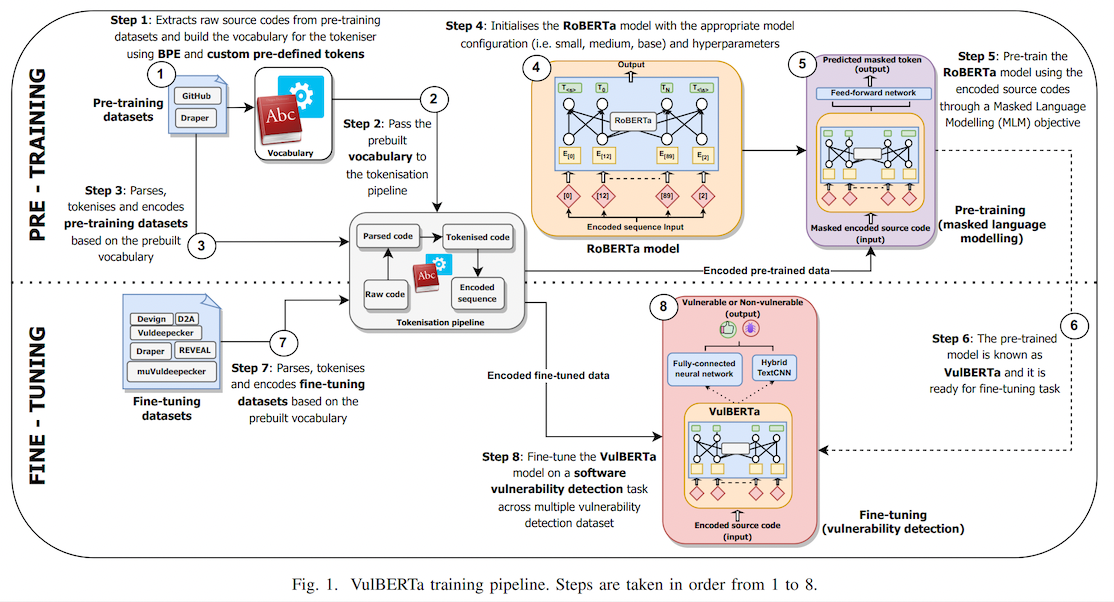|
--- |
|
license: mit |
|
arxiv: 2205.12424 |
|
datasets: |
|
- code_x_glue_cc_defect_detection |
|
metrics: |
|
- accuracy |
|
- precision |
|
- recall |
|
- f1 |
|
- roc_auc |
|
model-index: |
|
- name: VulBERTa MLP |
|
results: |
|
- task: |
|
type: defect-detection |
|
dataset: |
|
name: codexglue-devign |
|
type: codexglue-devign |
|
metrics: |
|
- name: Accuracy |
|
type: Accuracy |
|
value: 64.71 |
|
- name: Precision |
|
type: Precision |
|
value: 64.80 |
|
- name: Recall |
|
type: Recall |
|
value: 50.76 |
|
- name: F1 |
|
type: F1 |
|
value: 56.93 |
|
- name: ROC-AUC |
|
type: ROC-AUC |
|
value: 71.02 |
|
pipeline_tag: text-classification |
|
tags: |
|
- devign |
|
- defect detection |
|
- code |
|
--- |
|
|
|
# VulBERTa MLP Devign |
|
## VulBERTa: Simplified Source Code Pre-Training for Vulnerability Detection |
|
|
|
 |
|
|
|
## Overview |
|
This model is the unofficial HuggingFace version of "[VulBERTa](https://github.com/ICL-ml4csec/VulBERTa/tree/main)" with an MLP classification head, trained on CodeXGlue Devign (C code), by Hazim Hanif & Sergio Maffeis (Imperial College London). I simplified the tokenization process by adding the cleaning (comment removal) step to the tokenizer and added the simplified tokenizer to this model repo as an AutoClass. |
|
|
|
> This paper presents presents VulBERTa, a deep learning approach to detect security vulnerabilities in source code. Our approach pre-trains a RoBERTa model with a custom tokenisation pipeline on real-world code from open-source C/C++ projects. The model learns a deep knowledge representation of the code syntax and semantics, which we leverage to train vulnerability detection classifiers. We evaluate our approach on binary and multi-class vulnerability detection tasks across several datasets (Vuldeepecker, Draper, REVEAL and muVuldeepecker) and benchmarks (CodeXGLUE and D2A). The evaluation results show that VulBERTa achieves state-of-the-art performance and outperforms existing approaches across different datasets, despite its conceptual simplicity, and limited cost in terms of size of training data and number of model parameters. |
|
|
|
## Usage |
|
**You must install libclang for tokenization.** |
|
|
|
```bash |
|
pip install libclang |
|
``` |
|
|
|
Note that due to the custom tokenizer, you must pass `trust_remote_code=True` when instantiating the model. |
|
Example: |
|
``` |
|
from transformers import pipeline |
|
pipe = pipeline("text-classification", model="claudios/VulBERTa-MLP-Devign", trust_remote_code=True, return_all_scores=True) |
|
pipe("static void filter_mirror_setup(NetFilterState *nf, Error **errp)\n{\n MirrorState *s = FILTER_MIRROR(nf);\n Chardev *chr;\n chr = qemu_chr_find(s->outdev);\n if (chr == NULL) {\n error_set(errp, ERROR_CLASS_DEVICE_NOT_FOUND,\n \"Device '%s' not found\", s->outdev);\n qemu_chr_fe_init(&s->chr_out, chr, errp);") |
|
>> [[{'label': 'LABEL_0', 'score': 0.014685827307403088}, |
|
{'label': 'LABEL_1', 'score': 0.985314130783081}]] |
|
``` |
|
|
|
*** |
|
|
|
## Data |
|
We provide all data required by VulBERTa. |
|
This includes: |
|
- Tokenizer training data |
|
- Pre-training data |
|
- Fine-tuning data |
|
|
|
Please refer to the [data](https://github.com/ICL-ml4csec/VulBERTa/tree/main/data "data") directory for further instructions and details. |
|
|
|
## Models |
|
We provide all models pre-trained and fine-tuned by VulBERTa. |
|
This includes: |
|
- Trained tokenisers |
|
- Pre-trained VulBERTa model (core representation knowledge) |
|
- Fine-tuned VulBERTa-MLP and VulBERTa-CNN models |
|
|
|
Please refer to the [models](https://github.com/ICL-ml4csec/VulBERTa/tree/main/models "models") directory for further instructions and details. |
|
|
|
## How to use |
|
|
|
In our project, we uses Jupyterlab notebook to run experiments. |
|
Therefore, we separate each task into different notebook: |
|
|
|
- [Pretraining_VulBERTa.ipynb](https://github.com/ICL-ml4csec/VulBERTa/blob/main/Pretraining_VulBERTa.ipynb "Pretraining_VulBERTa.ipynb") - Pre-trains the core VulBERTa knowledge representation model using DrapGH dataset. |
|
- [Finetuning_VulBERTa-MLP.ipynb](https://github.com/ICL-ml4csec/VulBERTa/blob/main/Finetuning_VulBERTa-MLP.ipynb "Finetuning_VulBERTa-MLP.ipynb") - Fine-tunes the VulBERTa-MLP model on a specific vulnerability detection dataset. |
|
- [Evaluation_VulBERTa-MLP.ipynb](https://github.com/ICL-ml4csec/VulBERTa/blob/main/Evaluation_VulBERTa-MLP.ipynb "Evaluation_VulBERTa-MLP.ipynb") - Evaluates the fine-tuned VulBERTa-MLP models on testing set of a specific vulnerability detection dataset. |
|
- [Finetuning+evaluation_VulBERTa-CNN](https://github.com/ICL-ml4csec/VulBERTa/blob/main/Finetuning%2Bevaluation_VulBERTa-CNN.ipynb "Finetuning+evaluation_VulBERTa-CNN.ipynb") - Fine-tunes VulBERTa-CNN models and evaluates it on a testing set of a specific vulnerability detection dataset. |
|
|
|
|
|
## Citation |
|
|
|
Accepted as conference paper (oral presentation) at the International Joint Conference on Neural Networks (IJCNN) 2022. |
|
Link to paper: https://ieeexplore.ieee.org/document/9892280 |
|
|
|
|
|
```bibtex |
|
@INPROCEEDINGS{hanif2022vulberta, |
|
author={Hanif, Hazim and Maffeis, Sergio}, |
|
booktitle={2022 International Joint Conference on Neural Networks (IJCNN)}, |
|
title={VulBERTa: Simplified Source Code Pre-Training for Vulnerability Detection}, |
|
year={2022}, |
|
volume={}, |
|
number={}, |
|
pages={1-8}, |
|
doi={10.1109/IJCNN55064.2022.9892280} |
|
|
|
} |
|
``` |